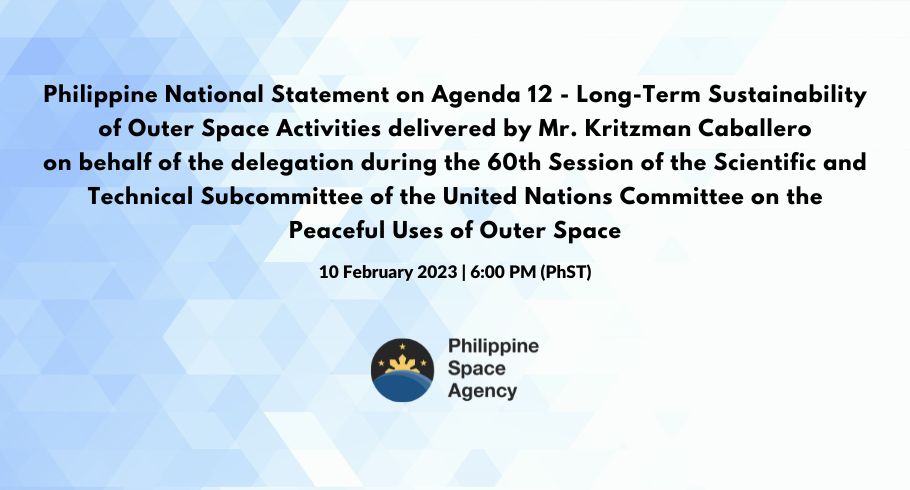60th SESSION OF THE SCIENTIFIC AND TECHNICAL SUBCOMMITTEE OF THE UNITED NATIONS COMMITTEE ON THE PEACEFUL USES OF OUTER SPACE
PHILIPPINE NATIONAL STATEMENT
AGENDA ITEM NO. 12 “LONG-TERM SUSTAINABILITY OF OUTER SPACE ACTIVITIES”
delivered by
MR. KRITZMAN CABALLERO
CHIEF, SPACE INTERNATIONAL COOPERATION DIVISION
PHILIPPINE SPACE AGENCY (PhilSA)
Thank you, Mr. Chair.
The Philippines adheres to the preamble and 21 Guidelines for the Long-Term Sustainability of Outer Space Activities (or the LTS Guidelines). We firmly believe that by doing so, we contribute to building best practices for the safety, stability, and sustainability of outer space activities. Over the last decade, we have witnessed the proliferation of space debris and the increasing complexity of space actors and operations, among others. The myriad challenges we face require a regulatory framework and a new regime to mitigate the risk and its adverse impact on humanity.
In 2019, the LTS Guidelines document was adopted during the 62nd Session of the Committee on the Peaceful Uses of Outer Space (COPUOS). Now, states have a set of standards that guide them in implementing and conducting space-related activities. We recognize that the voluntary implementation of the LTS Guidelines can present an immense challenge for developing countries with emerging technical and scientific capabilities.
Therefore, we call on global actors—not only the traditional ones—the state per se, but a concerted effort to include private companies and industries, academia, and civil society organizations—to address the issues of a new global order in space science and technology applications.
Mr. Chair,
I would like to share with the distinguished colleagues that since the creation of our Technical Working Group on Orbital Debris Protocols, we have fleshed out common issues experienced on the ground. The said Technical Working Group will build more efficient and effective inter-agency cooperation to address the problem of orbital debris. It also serves as an advisory body for the coordination, discussion, formulation, and integration of strategies, protocols, guidelines, and similar mechanisms to promote and ensure appropriate responses to rocket launches and other outer space activities that can pose risks to the Philippines and the region.
Mr. Chair,
The work with regard to the ratification of the Convention on International Liability for Damage Caused by Space Objects (or the Liability Convention) and the Convention on Registration of Objects Launched into Outer Space (or the Registration Convention) is on-going. The Philippines strongly believes that ratifying these two conventions signifies our strong commitment to the global norms and principles that strengthen the institution and enable good governance in space science and technology activities that will benefit current and future generations. This will generate positive results in the space value chain and strengthen the institutional structures of the space ecosystem.
Mr. Chair,
An emerging space nation like the Philippines can contribute to the effort to ensure the sustainability of outer space activities, and we can learn from the best practices of established ones in terms of their implementation of projects and activities. We reiterate that the Marcos Administration has unveiled its development agenda for 2023-2028. This agenda addresses both short-term issues and medium-term constraints to achieve a prosperous, inclusive, and resilient society. It included space exploration as one of the country’s core science, technology innovation foresight key operational areas. This trajectory will enable the Philippines to build strong economic gains and social transformation in the post-pandemic recovery.
We emphasize that we have incorporated the whole-of-government approach strategy to ensure that we achieve the targets and visions we have set for space science and technology application in the country. We continue to participate in important initiatives such as the Space 2030 Agenda and the Working Group on the Long-Term Sustainability of Outer Space Activities, among others.
Mr. Chair,
The Philippines reaffirms our commitment to continue exploring and maximizing the opportunities offered by the global space community towards further developing our space capabilities that will ensure a safe, stable, and sustainable outer space.
We encourage the dialogue with all actors in the global space community to be more committed and proactive in adherence to the norms and principles that will utilize and promote the peaceful uses and sustainability of outer space activities. As we bring the pieces of the puzzle together, we can paint a brighter future for humanity in space.
Thank you, Mr. Chair




